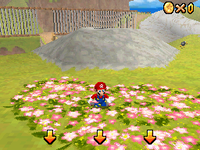Warp: Difference between revisions
| Line 13: | Line 13: | ||
==Names in other languages== | ==Names in other languages== | ||
;Warp Point | |||
{{foreign names | {{foreign names | ||
|Jap=ワープゾーン | |Jap=ワープゾーン | ||
Revision as of 10:38, November 2, 2024
- This article is about the recurring game mechanic. For Palutena's up-special move in the Super Smash Bros. games, see List of fighters debuting in Super Smash Bros. for Nintendo 3DS / Wii U § Palutena.

Warping appears in the Super Mario franchise as an action and a gameplay mechanic in which a character instantly travels from one location to another. Super Mario Bros. is the first Super Mario game to feature warping. Warping is most often done through the use of Warp Pipes. Some installments of the Super Mario series have Warp Zones, which allow for even farther travel.
In Super Mario 64, there is an invisible warp (also known as a Warp Point)[1] in ten of the courses: the Bob-omb Battlefield (which has two); Whomp's Fortress; Cool, Cool Mountain; Lethal Lava Land; Shifting Sand Land; Snowman's Land; Wet-Dry World; Tall, Tall Mountain; Tiny-Huge Island; and Rainbow Ride. The warps allow Mario to quickly travel between distant areas within the same course. In Super Mario 64 DS, once Mario or another character has warped, three down arrows briefly appear to point to the Touch Screen and show where he has been relocated.
In the Donkey Kong Country series and Donkey Kong Land series, warping is done through Warp Barrels, although some bonus rooms can indirectly be used as small warps because the exit back into the main level is often farther from the start. In Donkey Kong 64, warping is done from activated Bananaport Pads, though also within the same area.
Gallery
Screencast from Super Mario 64
Names in other languages
- Warp Point
| Language | Name | Meaning | Notes |
|---|---|---|---|
| Italian | Portale[3] | Portal |
References
- ^ June 1997. Nintendo Magazine System (AU) Issue #51. Page 47 and 48.
- ^ Super Mario-kun Volume 15, page 132.
- ^ November 15, 2018. Super Mario Bros. Enciclopedia. Magazzini Salani (Italian). ISBN 889367436X. Page 92.
